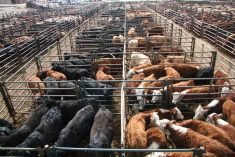More is not always better when it comes to manure applications.
Healthy soil with good levels of organic matter and structure are not likely to benefit by adding more manure, said research scientist Jim Miller of Agriculture Canada at Lethbridge.
“If you apply manure to agricultural land that is already productive, those soils usually have lots of organic matter already… you are not going to get an improvement just because the soil already has good physical properties. It is hard to improve something that is already in relatively good soil health,” he said.
Read Also

Canada told trade crisis solutions in its hands
Canadians and Canadian exporters need to accept that the old rules of trade are over, and open access to the U.S. market may also be over, says the chief financial correspondent for CTV News.
On the positive side, manure adds nitrogen and phosphorus that can improve yields. However manure is also high in salts and sodium, so added applications may offset any benefits to soil physical properties and could affect plant production.
“Sodium disperses clay particles in the soil and decreases the structure and infiltration of water. If your sodium content gets too high relative to calcium and magnesium, water infiltration problems could occur,” Miller said.
There is a place for added manure. Research using feedlot manure showed benefits when applied to sandy or hardpan soils, eroded or degraded soils common at construction, oil and gas well sites.
Too much manure could also affect the health of earthworms. They need the right mineral mix in the organic matter for their digestive systems. They do not thrive on organic matter alone.
More research is needed on the concept of repellence.
“We found there is certain organic compounds in the manure that actually repel water. When it starts to rain or irrigate, the infiltration will be delayed because the soil is repellent and it will make the water run off.”
As an example, he explained if water is dropped on waxed paper, it forms a ball and rolls off but if it is on regular paper it is absorbed. Soil can behave the same way. Once the soil becomes relatively wet and infiltration commences, repellency disappears and infiltration improves.
More research could include assessing the effect of different kinds of animal manure from beef, dairy, swine and poultry.
















